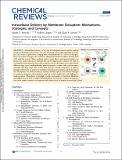Intracellular Delivery by Membrane Disruption: Mechanisms, Strategies, and Concepts
Author(s)
Stewart, Martin P; Langer, Robert S; Jensen, Klavs F
DownloadAccepted version (27.60Mb)
Terms of use
Metadata
Show full item recordAbstract
Intracellular delivery is a key step in biological research and has enabled decades of biomedical discoveries. It is also becoming increasingly important in industrial and medical applications ranging from biomanufacture to cell-based therapies. Here, we review techniques for membrane disruption-based intracellular delivery from 1911 until the present. These methods achieve rapid, direct, and universal delivery of almost any cargo molecule or material that can be dispersed in solution. We start by covering the motivations for intracellular delivery and the challenges associated with the different cargo typesñYsmall molecules, proteins/peptides, nucleic acids, synthetic nanomaterials, and large cargo. The review then presents a broad comparison of delivery strategies followed by an analysis of membrane disruption mechanisms and the biology of the cell response. We cover mechanical, electrical, thermal, optical, and chemical strategies of membrane disruption with a particular emphasis on their applications and challenges to implementation. Throughout, we highlight specific mechanisms of membrane disruption and suggest areas in need of further experimentation. We hope the concepts discussed in our review inspire scientists and engineers with further ideas to improve intracellular delivery. ©2018 American Chemical Society.
Date issued
2018-07Department
Massachusetts Institute of Technology. Department of Chemical Engineering; Koch Institute for Integrative Cancer Research at MITJournal
Chemical Reviews
Publisher
American Chemical Society (ACS)
Citation
Stewart, Martin P. et al., "Intracellular Delivery by Membrane Disruption: Mechanisms, Strategies, and Concepts." Chemical Reviews 118, 16 (August 2018): 7409–7531 doi. 10.1021/acs.chemrev.7b00678 ©2018 Authors
Version: Author's final manuscript
ISSN
1520-6890